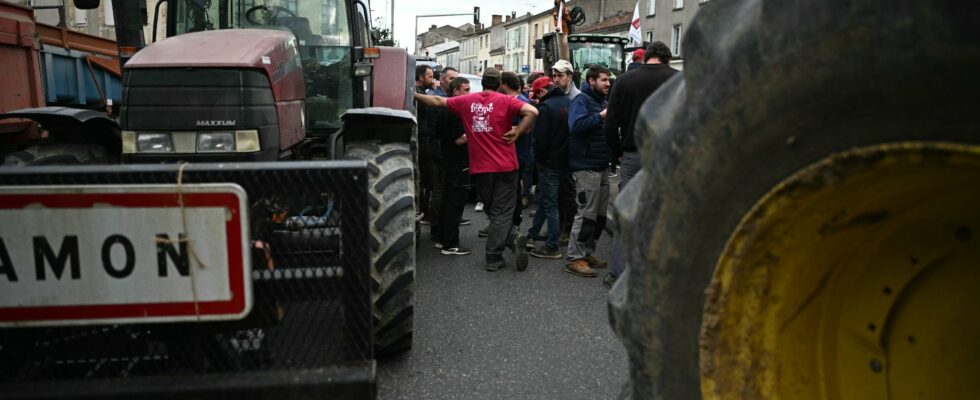In social matters, the evolution of a conflict is sometimes less due to official demands than to outbidding between trade union organizations. The agricultural mobilization launched this Monday, November 18 is likely to be no exception to this rule. Of course, it aims above all to warn the Barnier government against the free trade agreement between the European Union and Mercosur. And to express all the concern of the peasant world one year after the demonstrations and blockades at the beginning of 2024, when the promises made by the authorities have not all been kept and the situation has further deteriorated due to poor harvests and various diseases affecting livestock. But the extent of “peasant anger” will also depend on another deadline that has gone unnoticed but is decisive: the professional elections for the chambers of agriculture which must be held by the end of January 2025.
This ballot, which is held every six years, draws the political balance between the different trade union organizations. It determines who will be the preferred interlocutors of public authorities at all levels, locally and nationally. It also defines the amount of subsidies paid to each. So many issues which lead the FNSEA, the Young Farmers (JA), the Rural Coordination and the Peasant Confederation to be particularly attentive to the wishes of their members and to the anger coming from the field. There is no question, in fact, in this context, of appearing less energetic than the competitors and of risking losing precious votes. Everyone plays their part, trying to distinguish themselves from the others.
The voting method favors the first to arrive
During the last vote, in 2019, the FNSEA, which still presents a common list with the Young Farmers, won a large majority (55%). Behind her: the Rural Coordination (21.5%), rather classified on the right, the Peasant Confederation, rather on the left (20%), then the very minority Modef (1.3%). But the voting method favors the first to arrive since he wins half of the seats, the other half being distributed proportionally. As a result, the FNSEA, very present throughout the territory, dominates almost all of the chambers of agriculture. In mainland France, it directs 78 out of 84; the other six are distributed between the Rural Coordination (3), the Peasant Confederation (1), the last being a non-affiliated one.
However, this overwhelming domination also allows the FNSEA to hold mandates in all institutions linked to the agricultural world, such as agricultural social security, mutual insurance, high schools, etc. A considerable advantage in influencing decisions taken by public authorities. The issue is also financial. The distribution of subsidies paid to trade union organizations depends, in fact, on the results of the elections. These are distributed according to the following rule: 25% goes to the majority list, the remaining 75% is proportional. The FNSEA thus receives, for example, more than 14 million euros from public assistance on a budget of 20 million euros.
The government itself did not want to give more weight to the FNSEA thanks to these elections. At the beginning of 2024, the decree organizing the election planned to return to the system prior to the Hollande five-year term when only 50% of funding (and not 75%) was distributed proportionally. But in the version published last July, the provision had disappeared. The Peasant Confederation and the Rural Coordination, which feared losing 300,000 to 500,000 euros, took a breath, but the FNSEA and the JA expressed their dissatisfaction.
In the current mobilization, everyone advances their pawns with the fear of losing votes. Of course, due to the voting method, developments are very slow. Thus, if the Rural Coordination received 22% of the votes in 2019, compared to 12% in the 1990s, it only manages three chambers of agriculture. But everyone wonders if the conflict of last year, which saw the Rural Coordination fuel anger and the FNSEA led since 2023 by Arnaud Rousseau being overwhelmed by its base, has left its mark. The FNSEA and its allies were then criticized for having mainly defended the interests of large cereal producers, linked to agro-industry, to the detriment of smaller farmers, in particular breeders. Everyone fears further progress by Rural Coordination, more in line with the anger of the country which is expressed politically through the National Rally vote.
As of this Monday and Tuesday, the FNSEA and the JA have called for demonstrations on the occasion of a G20 which is being held in Brazil. The Peasant Confederation is currently favoring gatherings in front of French and European institutions. The Rural Coordination, which meets in congress on Tuesday and Wednesday, then promised “an agricultural revolt”. But the form and scale of the protests could very quickly evolve depending on reactions from the base. Let it ignite and all the organizations will follow, for fear of being left behind by the most radical among them.
.
